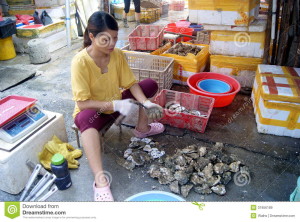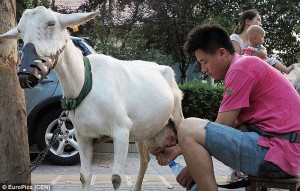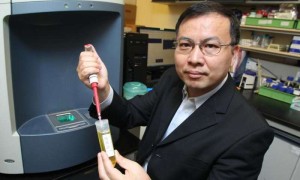As the number sickened by Vibrio rises to 72 in western Canada, researchers report on dietary and medical risk factors for Vibrio parahaemolyticus (VP) infection in the coastal city Shenzhen in China.
 Methods: In April–October 2012, we conducted a case–control study in two hospitals in Shenzhen, China. Laboratory-confirmed VP cases (N = 83) were matched on age, sex, and other social factors to healthy controls (N = 249). Subjects were interviewed using a questionnaire on medical history; contact with seawater; clinical symptoms and outcome; travel history over the past week; and dietary history 3 days prior to onset. Laboratory tests were used to culture, serotype, and genotype VP strains. We used logistic regression to calculate the odds ratios for the association of VP infection with potential risk factors.
Methods: In April–October 2012, we conducted a case–control study in two hospitals in Shenzhen, China. Laboratory-confirmed VP cases (N = 83) were matched on age, sex, and other social factors to healthy controls (N = 249). Subjects were interviewed using a questionnaire on medical history; contact with seawater; clinical symptoms and outcome; travel history over the past week; and dietary history 3 days prior to onset. Laboratory tests were used to culture, serotype, and genotype VP strains. We used logistic regression to calculate the odds ratios for the association of VP infection with potential risk factors.
Results: In multivariate analysis, VP infection was associated with having pre-existing chronic disease (adjusted odds ratio [aOR], 6.0; 95% confidence interval [CI], 1.5–23.7), eating undercooked seafood (aOR, 8.0; 95% CI, 1.3–50.4), eating undercooked meat (aOR, 29.1; 95% CI, 3.0–278.2), eating food from a street food vendor (aOR, 7.6; 95% CI, 3.3–17.6), and eating vegetable salad (aOR, 12.1; 95% CI, 5.2–28.2).
Conclusions: Eating raw (undercooked) seafood and meat is an important source of VP infection among the study population. Cross-contamination of VP in other food (e.g., vegetables and undercooked meat) likely plays a more important role. Intervention should be taken to lower the risks of cross-contamination with undercooked seafood/meat, especially targeted at people with low income, transient workers, and people with medical risk factors.
Risk factors for Vibrio parahaemolyticus Infection in a southern coastal region of China
Foodborne Pathogens and Disease. Ahead of print. doi:10.1089/fpd.2015.1988.
Liao Yuxue, Li Yinghui, Wu Shuyu, Mou Jin, Xu Zengkang, Cui Rilin, Klena John D., Shi Xiaolu, Lu Yan, Qiu Yaqun, Lin Yiman, Xie Xu, Ma Hanwu, Li Zhongjie, Yu Hongjie, Varma Jay K., Ran Lu, Hu Qinghua, and Cheng Jinquan
http://online.liebertpub.com/doi/abs/10.1089/fpd.2015.1988
 The Hong Kong-based service launched in November 2014 as a marketing experiment and has stuck around like dog doo on a sneaker tread.
The Hong Kong-based service launched in November 2014 as a marketing experiment and has stuck around like dog doo on a sneaker tread.









